Details

The Development of the English Modals
1. Auflage
|
13,99 € |
|
| Verlag: | Grin Verlag |
| Format: | EPUB, PDF |
| Veröffentl.: | 10.12.2010 |
| ISBN/EAN: | 9783640774265 |
| Sprache: | englisch |
| Anzahl Seiten: | 13 |
Dieses eBook erhalten Sie ohne Kopierschutz.
Beschreibungen
Essay from the year 2007 in the subject English Language and Literature Studies - Linguistics, grade: 2,7, Free University of Berlin (Institut für Englische Philologie), course: History and Variation of English II, language: English, abstract: The question about the grammaticalization process of the modal auxiliary verbs from Old English to Modern English is a highly discussed topic among linguistics and scholars today. It is undisputed that, in the English that is spoken today, words like 'should', 'could' etc. form a separate category, or rather a subcategory, 'modal' that does not only syntactically differ from the usual English verbs, but also morphologically. That is, of course with the exception of a few regional variations such as for example Scots, but since the main focus of this paper is on the standard British and American English dialects, those regional non-standard dialects will not be taken into consideration here.
For every native and average non-native speaker, it is natural that modals like 'will' for example don't take the obligatory inflectional ending -s in third person singular present. Or that 'should', 'would' or 'could' do not have past tense meaning, although the forms itself are actually a past form. And it is also natural that just those verbs, which we subcategorize as modals, will neither appear as infinitives with 'to' (*'I have to will'), nor do they require 'to' in combination with regular verbs (*'I should to go').
Today we instinctively know that those usual grammatical rules that regular verbs require to be followed in order to correctly be embedded in a sentence, don't apply to the modals. How did we get to this point, though?
In the following paper I want to take a closer look at how the modals developed from regularly inflectional verbs, that they still were in Old English, to this new category 'modal' which is no longer a full verb that can stand alone in a sentence, but more of a grammatical function that signals either epistemic or deontic meaning.
For every native and average non-native speaker, it is natural that modals like 'will' for example don't take the obligatory inflectional ending -s in third person singular present. Or that 'should', 'would' or 'could' do not have past tense meaning, although the forms itself are actually a past form. And it is also natural that just those verbs, which we subcategorize as modals, will neither appear as infinitives with 'to' (*'I have to will'), nor do they require 'to' in combination with regular verbs (*'I should to go').
Today we instinctively know that those usual grammatical rules that regular verbs require to be followed in order to correctly be embedded in a sentence, don't apply to the modals. How did we get to this point, though?
In the following paper I want to take a closer look at how the modals developed from regularly inflectional verbs, that they still were in Old English, to this new category 'modal' which is no longer a full verb that can stand alone in a sentence, but more of a grammatical function that signals either epistemic or deontic meaning.
Diese Produkte könnten Sie auch interessieren:

Politeness in Shakespeare: Applying Brown and Levinson´s politeness theory to Shakespeare's comedies

von: Abdelaziz Bouchara

43,00 €















